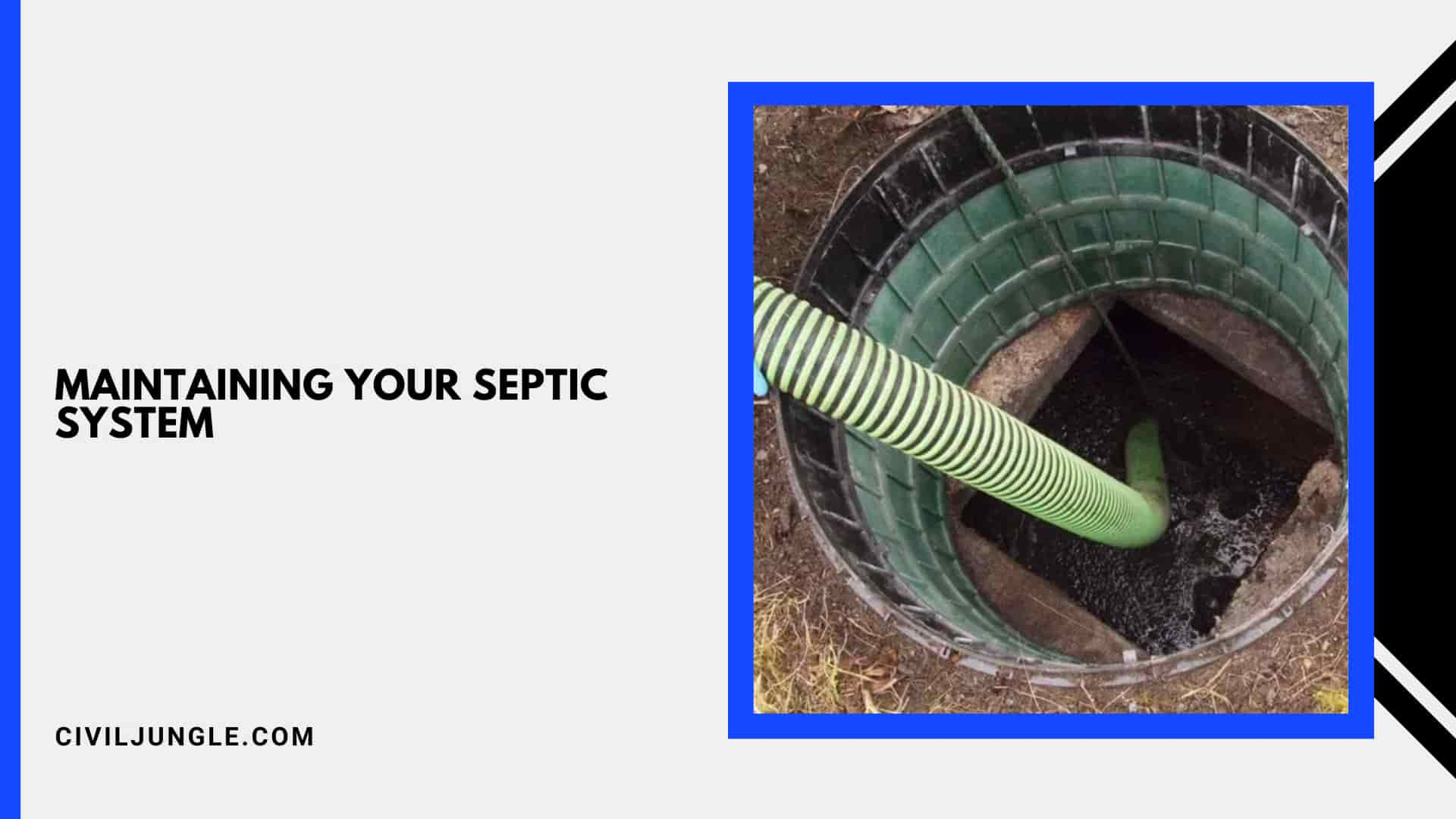Why Maintain Your Septic System?
Important Point
Septic system upkeep is crucial for three reasons.
- The first reason has to do with money. Septic systems that fail are costly to maintain and restore, and insufficient homeowner care is a significant causative factor in system failure. In relation to the total of a new system, the septic system includes so little preventative maintenance.
- The wellness of your family, society, and surroundings is the second and most crucial reason to maintain your system properly. Poorly treated home wastewater is dumped into the environment whenever septic systems fail.
- Contact with untreated human feces can put people’s health in danger. Septic system failure can contaminate adjacent wells, groundwater, and drinking water sources.
- Chemicals that are incorrectly disposed of through a septic system might contaminate local water sources and cause an early system failure. As a result, homeowners should learn what may and cannot be disposed of through a septic system.
- The economic health of your community is a third reason to maintain your septic system. Property values can be affected by failing septic systems. Building permits for these properties are sometimes denied.
- Additionally, malfunctioning septic systems may lead to the contamination of local rivers, lakes, and shorelines used for commercial or recreational purposes in your town.
Saves You Money
Compared to the expense of repairing and maintaining a failing system, which might cost around $3,000 and $7,000 for conventional systems, routine maintenance charges of $250 to $500 per 3 to 5 years are an absolute bargain.
Alternative methods can be even more expensive than traditional methods. The number of people living in the residence and the capacity of the network measure the timing of pumping needed.
Protects the Value of Your Home
A septic system that is unworkable or in disrepair can reduce the value of your home and may expose you to a hefty legal risk.
Also Read: Exploring Pivoted Windows: Types, Mechanisms, and Material Choices
Preserves the Health of you and your Neighbors
There are bacteria and viruses that can cause illness in household wastewater, in addition to high levels of nitrogen and phosphorus.
The majority of these pollutants can be removed by a well-maintained septic system. Water contamination caused by improperly handled sewerage from cesspools can lead to human and animal diseases.
Swimmers are at risk of contracting different infectious ailments, from eye and ear infections to acute gastrointestinal illness and hepatitis, if sewage is not properly cleaned.
The Ecosystem Is Safeguarded
Daily, more than four billion gallons of wastewater are buried below. If home wastewater is not properly handled, it can contaminate groundwater, which can be harmful to both drinking water and the environment.
Bacteria, viruses, and harmful substances are released into local waterways when septic systems fail. Pollutants leaked from the ground end up polluting local waterways and ecosystems by killing native plants as well as fish and shellfish.
Regularly Inspect and Maintain Your Septic System
Maintaining your septic system can extend its lifespan. On-site System Maintainers may inspect and monitor your septic system on a regular basis.
- Gravity systems: 3 years
- Systems for distributing pressure: Annually
- ATU, membrane bioreactor, drip irrigation, and other proprietary systems: Once a year, or more often if necessary by the manufacturer.
- It is recommended that you replace your mound or sand filtration system every year
Pump Your Septic Tank as Needed
It Depends on how much water is used in the family and/or company. Water flow increases as the number of individuals using your septic system increases.
Because of this, your septic tank will fill up quicker, necessitating additional pumping. Septic tank lids should be kept tightly closed and locked.
Unscrewed lids pose a safety threat! Unsecured tanks can cause someone to fall in. You should check that the tank access lids are not damaged or degraded to prevent any accidents.
Be Water-Wise
Your septic system’s lifespan may be extended if you use less water. Too much water usage is a common cause of system failure. Land and roof drains should be diverted away from the drainage field It’s possible that this extra water will prohibit the drain field from working correctly as a result.
Landscape with Love
As far as septic tanks and drain fields are concerned, grass is the greatest choice. It is possible to employ other types of plants with shallow root systems as well for landscaping purposes.
Septic tank lids should always be within easy reach. Installation of “risers” will reduce the time and cost of septic tank pumping/monitoring. A “riser” also reduces the amount of mess and interruption in your yard when pumping and monitoring.
Use a Garbage Disposal
Garbage disposals add particles and grease to your drain field, which may quickly pile up and plug it. If you really must use one, try to keep it to a minimum.
Nothing but toilet paper should be flushed into your septic system. Cleaning wipes, baby wipes, facial tissue, personal care items, and paper towels should not be flushed. Even wipes labeled as flushable or septic-safe should be thrown away.
Put Household Chemicals Down the Drain
Chemicals kill microorganisms that are needed to break down solids in your system. Long-term use of antibiotics, for example, can kill vital bacteria in your septic tank and drain field.
Vehicles should not be parked on your drain field, reserve space, or septic tank. Patios, carports, decks, storage facilities, sports courts, landscaping plastic, and grazing animals should also be kept away from the drain field and drain field reserve zones. This will keep soils from compacting and pipes from bursting.
Use Septic Tank Additives
These items may be hazardous to your drain field because they contribute more sediments to the system, which can block it. Groundwater and surface water can both be polluted by pollutants.
Water from Hot Tubs Should Be Drained into the Septic Tank
Large amounts of water can cause your drain field to ‘drown,’ and chlorine can kill essential microorganisms in your septic tank and drain field. Drain hot tubs, especially the drain field, from the system.
Maintaining Your Septic System
Pump Your Tank
According to the number of people living in your house and the size of your septic tank, we recommend inspecting your conventional tank every 3 to 5 years at the very least.
Every 1-2 years, a house may require more regular pumping. Waste water may be released without sufficient time for treatment and particle separation if the septic tank has not been drained out in five or more years.
Groundwater contamination or clogging of drain fields may result. The frequency of pumping will depend on whether you have a Best Available Technology (BAT) unit or not.
Add an Outlet Filter to the Septic Tank
To prevent scum and sludge from reaching your absorption area, insert filters in the exit baffle. The filter can be cleaned annually by a septic professional.
Fill Your Buried Manhole with a Riser
Pumping your tank through the manhole will be required by septic professionals. This is especially true if the manhole is buried. To make things easier for professionals and cheaper for you, we recommend installing a riser to allow access to the manhole from below the earth.
Don’t Flood Your System
To allow scum and sludge to settle, septic tanks must be left alone for a period of time. If you rush too much water through your tank, it won’t be able to accomplish its job properly.
Showers, laundry, and dishwashing should all be scheduled in advance to avoid flooding your tank. Any leaking faucets or toilets should be repaired as soon as possible.
Be Cautious About What You Flush Down Your Drains and Toilets
Consider flushing only water, human waste, and toilet paper down the toilet. Utilize your waste disposal sparingly. Don’t let your system be clogged with greasy substances like grease, feminine products, cigarettes, baby wipes, chemicals, or expired/unused medicine.
Even if a product claims to be flushable or biodegradable, that doesn’t apply to a septic tank system. Spend less money by eliminating the use of unnecessary additives in your septic system. All the helpful bacteria you need to maintain a healthy system can be found in regular flushing.
Also Read:
Inspect Your System for Signs of Trouble
- Explore your property and keep an eye out for
- Overflowing drain fields or wet regions
- Some sludge particles may have blocked the drain field, and tree roots or damaged pipes may be preventing the wastewater from spreading across the drain field as intended.
- The amount of water used in residence may have surpassed the system’s design capacity.
- Here, instead of moving through the soil as it should, waste water rises to the top, posing significant health risks and producing unpleasant odors.
- Water in the toilets is slowing down or clogging up.
- It is possible for the basement to be flooded with sewage in the worst situations.
- Congested sewage lines leading to the tank, a clogged inlet or exit pipe, a full septic tank, or an ineffective drain field might cause this.
- In the home, above the tank and drain field, or from the vent pipe, sewage scents are present.
- If the system is working properly, there shouldn’t be any smells. It’s possible that smells are an indication that the system is malfunctioning if they are present.
Frequently Asked Questions(FAQ):
How Often Should I Pump My Septic Tank?
Generally, you should pump your septic tank every 3 to 5 years. However, the frequency depends on the number of people in your household and the size of the tank. Some systems may require more frequent pumping, especially if they are heavily used.
What Are the Signs That My Septic System Is Failing?
Signs of a failing septic system include slow drains, gurgling sounds in the plumbing, sewage odors in the house or yard, wet spots or lush vegetation over the drain field, and sewage backups in the house.
What Should Not Be Flushed or Poured Down the Drain?
Avoid flushing non-biodegradable items such as wipes (even those labeled as flushable), feminine hygiene products, diapers, cigarette butts, and paper towels. Also, do not pour chemicals, grease, oils, paints, or medications down the drain.
Can Household Chemicals Harm My Septic System?
Yes, household chemicals can kill the beneficial bacteria in your septic tank that break down waste. Avoid using harsh chemicals and dispose of household chemicals properly.
How Can I Prolong the Life of My Septic System?
Regular maintenance, conserving water, spreading out water usage, not flushing harmful items, and using septic-safe products can help prolong the life of your septic system. Additionally, regular inspections by a professional are crucial.
What Should I Do If I Suspect a Problem with My Septic System?
If you suspect a problem, contact a septic system professional immediately. Early intervention can prevent more serious and costly issues.
Can I Install a Garbage Disposal with a Septic System?
While you can install a garbage disposal, it is not recommended as it increases the amount of solids in the septic tank, requiring more frequent pumping. If you use a garbage disposal, try to limit its use.
How Does Water Usage Affect My Septic System?
Excessive water usage can overload your septic system, leading to system failure. Practice water conservation techniques, such as fixing leaks, installing water-saving fixtures, and spreading out laundry and dishwasher loads.
What Are Septic Tank Additives, and Should I Use Them?
Septic tank additives are products marketed to improve septic system performance. However, most experts do not recommend them as they can harm the system. Natural bacterial action is usually sufficient to maintain the system.
Can Landscaping Affect My Septic System?
Yes, landscaping can affect your septic system. Plant grass or shallow-rooted plants over the drain field to prevent soil erosion. Avoid planting trees or shrubs with deep roots near the septic system as they can damage pipes.
Like this post? Share it with your friends!
Suggested Read –
- What House Leveling Costs?
- What Slab Foundation Repair Costs?
- Why the Need for Dallas Foundation Repair?
- What Should a Construction Contract Include?
- Types, Materials &Methods of House Foundation



Leave a Reply